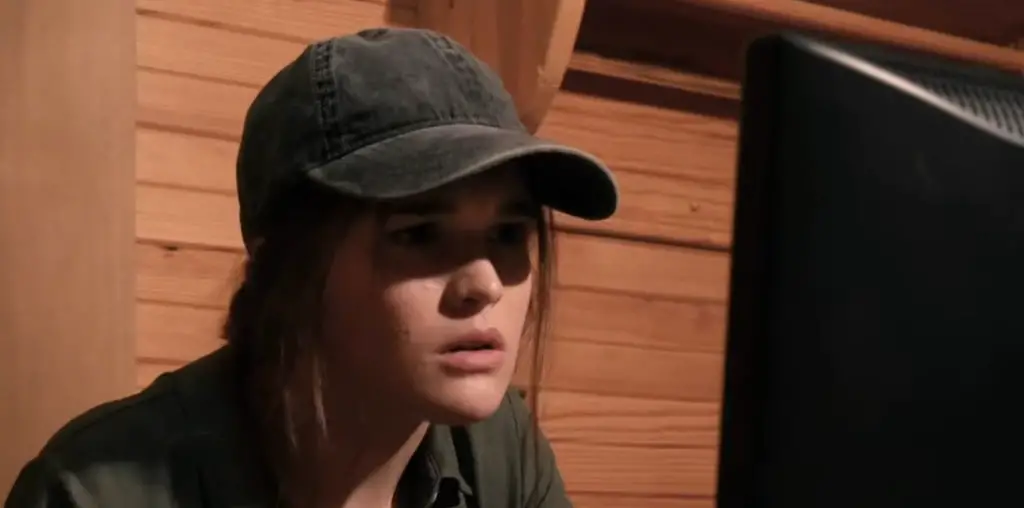
In short, Rob Zombie has absolutely nailed it with The Devil’s Rejects, a midnight rental or multiple-viewing must-own for anyone who likes their movies gritty and pulpy, badass and balls-out. Conversely, anyone who’s easily offended (not by anything specific, but just easily offended in general) best not even bother.
Forget Zombie’s psychedelic slash-’em-up fever dream House of 1,000 Corpses. That well-intentioned disappointment is a prequel to Rejects in the loosest sense, taking the same core characters out of their cartoonish pit of hell and onto the dusty trails of Nowheresville, caught between the lunatic arm of the law (William Forsythe) and their incessant desires for depravity and bloodshed.
Forsythe, in full redneck, epithet-spewing, vigilante cop mode, plays Sheriff John Wydell. After he and his boys raid the murderous Firefly Family’s ramshackle ranch, only the brother-and-sister tandem of Otis (Bill Moseley) and Baby (Sheri Moon Zombie) make it out unscathed, and hit the road, with Wydell hot on their path. Soon enough, their perverted papa, Captain Spaulding (Sid Haig, in a much-welcomed, expanded and more layered role) comes along for the ride––and the killing––as the Fireflys take hostages, take lives and even find time for some booze and hookers. That is until the inevitable final showdown with Wydell and the cops, an unforgettable climax that’s downright beautiful in its gory artistry. (You’re unlikely to see a more vivid depiction of a bullet’s impact upon flesh any time soon.)
Where Rejects primarily differs from Corpses, and ultimately surpasses it, is in its tone and texture. Zombie has merged a superb Southern rock soundtrack with grimy, raw cinematography to evoke the best––and campiest––of ’70s road films, from Dirty Mary, Crazy Larry to Smokey and the Bandit. His homage to both the decade’s style of filmmaking and the era itself is most effective in moments such as the opening credits, where the title card careens across the screen in a Dawn of the Dead-esque font amidst a country-rock ruckus; a later scene at a friend’s brothel, where white-trash hedonism is edited like a Paul Thomas Anderson movie on Schlitz and crystal meth; and the aforementioned finale, in which “Freebird” finds a whole new way to strike a chord.
This is not a film without flaws: There are times where Zombie can’t deny his own bloodlust and nearly ruins what works so well about the movie––its realness––with over-the-top grisliness. And the acting, while knowingly less-than-Oscar-worthy, occasionally does more dialogue-driven stretches a disservice, such as when Moseley unconvincingly delivers a pre-slaughter sermon a la Sam Jackson in Pulp Fiction. However, even the latter concern is counterbalanced by the sheer in-joke joy of seeing the likes of Ken Foree (of Dawn of the Dead fame), Michael Berryman (The Hills Have Eyes) and Tom Towles (Henry: Portrait of a Serial Killer) chew up scenery and spit it out.
In the end though, Rejects triumphs where so many so-called classic returns to the genre (Cabin Fever comes to mind) have failed, because Zombie’s figured out what young guns like Eli Roth haven’t: You can have your horror well-paced, nuanced and character-driven, but still push the NC-17 envelope and make it all coalesce. And in doing so, he has finally fulfilled his promise as a director with reliable sensibilities and the talent to match, and created a genre homage that should endure as a cult classic in its own right.
As for the package itself, the two-DVD set is a surprising smash. The second disc is comprised of a two-plus-hour documentary on the day-to-day making of the film, an experience bound to bore those turned off by the film, but prove relentlessly engaging to those who get its charms. It’s here that Zombie articulates what the movie demonstrates: his maturation as a filmmaker and the wealth of worthy influences that left their mark on Rejects. That, and the fact that he is undeniably a bit demented, as even his cast members––including his wife––admit to being turned off or disturbed by certain scenes. And on the first disc, even the deleted scenes are worthwhile, thanks to a lengthy and absurdly violent few minutes featuring Rosario Dawson. Also included are an archived TV performance by Buck Owens; hilarious Captain Spaulding commercials; an entertaining, if overlong, segment with Daniel Roebuck (yet another keen casting choice) expanding his brief role as a cheesy ‘70s talk-show host; a tribute to the late Matthew McGrory, aka Tiny Firefly; and the standard stills, soundtrack promo, etc.
